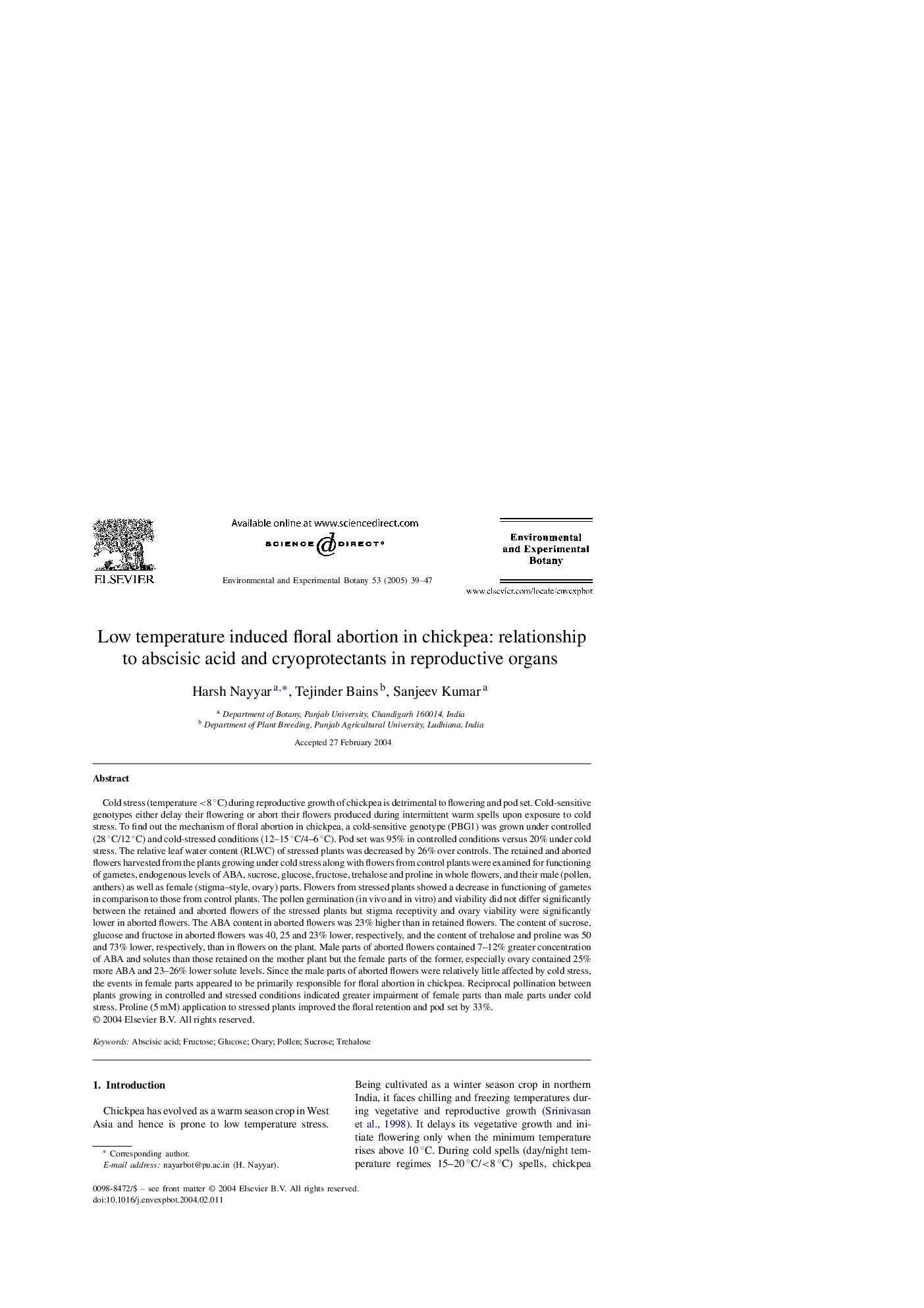| کد مقاله | کد نشریه | سال انتشار | مقاله انگلیسی | نسخه تمام متن |
|---|---|---|---|---|
| 9485724 | 1329286 | 2005 | 9 صفحه PDF | دانلود رایگان |
عنوان انگلیسی مقاله ISI
Low temperature induced floral abortion in chickpea: relationship to abscisic acid and cryoprotectants in reproductive organs
دانلود مقاله + سفارش ترجمه
دانلود مقاله ISI انگلیسی
رایگان برای ایرانیان
کلمات کلیدی
موضوعات مرتبط
علوم زیستی و بیوفناوری
علوم کشاورزی و بیولوژیک
بوم شناسی، تکامل، رفتار و سامانه شناسی
پیش نمایش صفحه اول مقاله

چکیده انگلیسی
Cold stress (temperature <8 °C) during reproductive growth of chickpea is detrimental to flowering and pod set. Cold-sensitive genotypes either delay their flowering or abort their flowers produced during intermittent warm spells upon exposure to cold stress. To find out the mechanism of floral abortion in chickpea, a cold-sensitive genotype (PBG1) was grown under controlled (28 °C/12 °C) and cold-stressed conditions (12-15 °C/4-6 °C). Pod set was 95% in controlled conditions versus 20% under cold stress. The relative leaf water content (RLWC) of stressed plants was decreased by 26% over controls. The retained and aborted flowers harvested from the plants growing under cold stress along with flowers from control plants were examined for functioning of gametes, endogenous levels of ABA, sucrose, glucose, fructose, trehalose and proline in whole flowers, and their male (pollen, anthers) as well as female (stigma-style, ovary) parts. Flowers from stressed plants showed a decrease in functioning of gametes in comparison to those from control plants. The pollen germination (in vivo and in vitro) and viability did not differ significantly between the retained and aborted flowers of the stressed plants but stigma receptivity and ovary viability were significantly lower in aborted flowers. The ABA content in aborted flowers was 23% higher than in retained flowers. The content of sucrose, glucose and fructose in aborted flowers was 40, 25 and 23% lower, respectively, and the content of trehalose and proline was 50 and 73% lower, respectively, than in flowers on the plant. Male parts of aborted flowers contained 7-12% greater concentration of ABA and solutes than those retained on the mother plant but the female parts of the former, especially ovary contained 25% more ABA and 23-26% lower solute levels. Since the male parts of aborted flowers were relatively little affected by cold stress, the events in female parts appeared to be primarily responsible for floral abortion in chickpea. Reciprocal pollination between plants growing in controlled and stressed conditions indicated greater impairment of female parts than male parts under cold stress. Proline (5 mM) application to stressed plants improved the floral retention and pod set by 33%.
ناشر
Database: Elsevier - ScienceDirect (ساینس دایرکت)
Journal: Environmental and Experimental Botany - Volume 53, Issue 1, February 2005, Pages 39-47
Journal: Environmental and Experimental Botany - Volume 53, Issue 1, February 2005, Pages 39-47
نویسندگان
Harsh Nayyar, Tejinder Bains, Sanjeev Kumar,